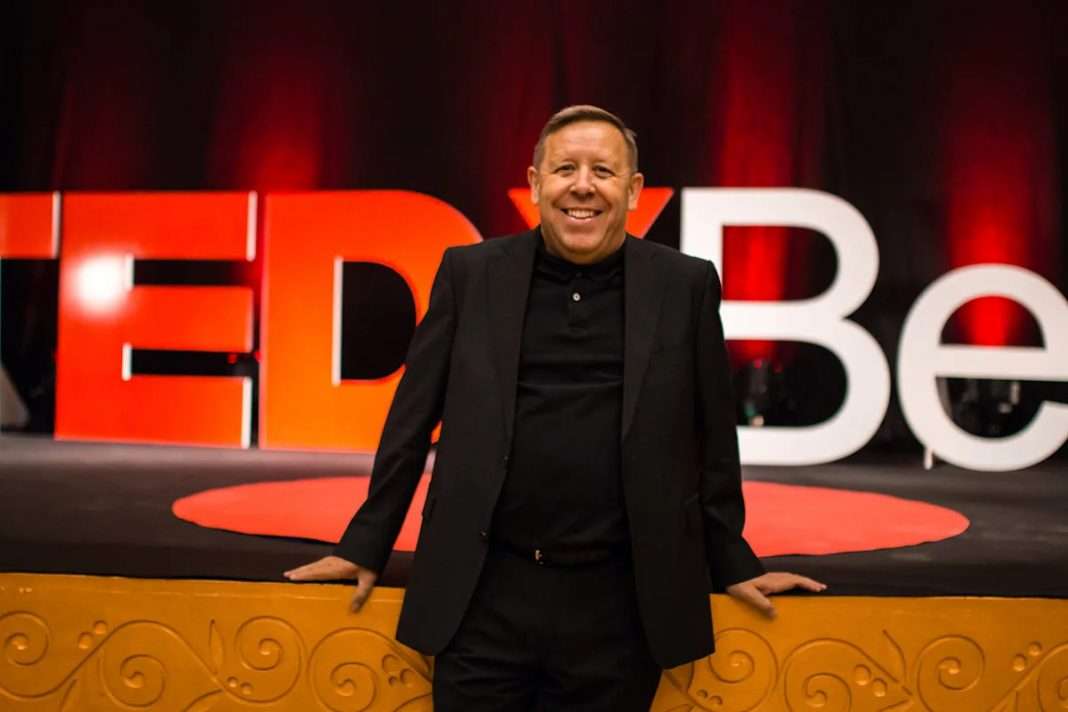Award-winning corporate motivational speaker, Gordon Tredgold, who has been officially named No. 6 on Global Gurus Top 100 Leadership Experts and Speakers list for 2021, talks about executive coaching.
Gordon Tredgold knows his stuff. He has been helping people to succeed with his years of experience and professional guidance. The author of three renowned books: FAST – 4 Principles Every Business Needs to Drive Success and Achieve Results, Leadership it’s a Marathon Not a Sprint, and Practitioners Guide to Leadership, talks about the inner voice.
The coaching expert has said people are afraid of failure, and they can overcome that fear to succeed. He also explains who everyone can improve their lifestyle for success. So, we decided to sit down with Gordon Tredgold and find out more.
- You are a Leadership Consultant and Executive Coach, what does that exactly mean?
Basically, it means that I work with clients to help them achieve the results that they are looking for, it might be setting up a change program for success, helping them improve performance and get the best out of the teams, or helping to define their culture. Having spent 25 years successfully delivering large complex projects, and running teams’ of 1000 people, I know and understand what’s needed deliver success. Each assignment is different, it might involve coaching where I am helping to develop their skills to deal with a challenge, or consulting where I’m more hands-on involved in delivering the solution or it could be in an advisory capacity helping set the strategy and direction.
- There are lots of people who manage to sail through life and succeed, while others fail at business, relationships and careers, why is that?
That’s a great question, and its one I asked myself about 7 years ago that led to a change of direction for myself. I wondered whether I had a repeatable process that I was using, as I had created a strong track record of success in delivering complex projects and turning round failing initiatives, wondering why I was succeeding where others had struggled. What I found was that I did actually have a process, one that was fairly repeatable and could be used in pretty much any in any situation, and that got me to thinking that I’d like to systematize it and teach it to other people to help them with their projects. And I think this is what differentiates those that succeed, they have a process, they know what works. When you look at the reasons for failure, their pretty consistent, and can easily be avoided once you know what they are. But one of the big challenges is that too often we have to just dive in due and start working, due to time pressures, and then we make these mistakes which can make success impossible. Once you have a process that you trust and can rely on things become a whole lot easier.
- I hear a lot about the voice of self-doubt or lack of believing, what does that mean and how can that stop a person from succeeding?
People are not afraid of hard work, they’re afraid of failure, and lore often it’s this fear of failure that will even stop them from trying a new challenge or taking on a difficult project. And it’s these self-doubts that feed that fear, that can hold us back. For many years I had self-doubts about my ability as an author, and that stopped me from even trying to write, let alone pitching publications. Finally, I decided that. I didn’t care about whether people thought my style as good or bad, I just wanted to share what I’d learned about leadership. And within 3 years my blog was one of the Top Leadership blogs and I was a regular contributor to Inc, Entrepreneur, Huffington Post, and had articles in Forbes, Success, Business Insider, have my articles translated into over 20 languages and had a book that was a finalist in Management book of the year. But my self-doubt created a reluctance to write had effectively stopped me from reaching my full potential for years.
A big part of my coaching is helping people see their full potential, eliminating those self-doubts and set them on the path to realising it.
- You help others to grow, but how do you develop yourself and continue to grow?
One of the biggest surprises for me is just how much you learn yourself from teaching. It actually requires a greater level of understanding to teach something that it does to do it. So just by continuing to teach leadership and train people that forces me to grow and increase my level of understanding. Plus, I have very analytical mind and I am always trying to understand how things work, the cause and effect and then how we can improve them, it’s a bit nerdy but then I am a mathematician by education.
- Do you believe that everyone can grow or are there types of people who cannot be helped?
Every single one of us can grow, we can all do better if we want to, we just need to understand how, and have the desire to do it. In my experience it’s a lack of knowing how not a lack of desire that holds people back. One of the challenges is to help people see it, so a lot of time coaching is about finding the right context and the best way to explain thigs so that people can see the solution. Too often people are only taught one way and if they don’t see it, then a repetition of that teaching isn’t going to help. We have to tailor our approaches for different people, making things context relevant which will help foster their understanding.
- Who should seek out an executive coach?
I remember when I was first offered a coach 15 years ago when I worked for DHL 15, at first, I thought what a cheek, but actually it turned out to be a pivotal moment for me. Even though I had been very successful up to that point and as far as I was concerned, I was achieving my full potential, as I was successfully leading a $100m dollar program. But what I didn’t know was that I had some self-limiting beliefs that were holding me back from achieving my true potential, potential that I couldn’t see, which actually allowed me to go onto much bigger and better things.
So, for me I think everyone can benefit from having a coach, we all have blind spots, or things that we need help with. It light be about improving a skill, refining an approach or just giving an external perspective onto a situation which can help move us forward.
For those of you who might be thing, it’s not for me just remember Usain Bolt has a coach, Steve Jobs used a coach, many very successful people use coaches, as well as those who are on their way up that need a little support on the journey.
- Can you tell us why coaching is a good investment either for an individual or for a business?
For leadership coaching anything that helps improve employee engagement is going to have a direct impact on the top and bottom line of a business. Engaged employees tend to increase revenue and profitability by over 20%, and highly engaged employees are twice as productive which is going to have positive benefits. For individuals I find that the benefits of coaching can be to help then in their career growth, preparing the for promotions or landing new opportunities and giving them the confidence and capability to succeed in them.
- Can you give an example of typical coaching scenario?
Normally there’s a challenge or opportunity that the client has, it might be one that they are struggling to deal with or where they are looking for a fresh perspective, or to get some input from someone who has experienced this before.
First step is to help clarity the desired outcome, understand the challenge and then help create clarity about the way forward. Helping to define the next steps, ideally in way that the client believes and trusts in. The last part is critical because without belief there is no execution, accountability or follow through. Sometimes the changes made are small, or very subtle, but will have a dramatic impact.
At one client, my involvement was in helping them to define their strategic goals. There was a reluctance to write down clear goals and commit to them. This was in part due to a lack of confidence in their ability to achieve them and also to a lack of trust that the senior management team would buy into the goals.
Over the course of a couple of sessions, working with the senior management team we came up with a set of strategic goals that not only they agreed with, but were excited about and these goals would drive growth by 50% over a 3-year period which was significantly more aggressive than they were previously performing.
- There are lots of executive coaches out there, so what is the secret to finding a good executive coach?
I think there are a couple of things that are important
- Chemistry, this is critical, how comfortable do you feel with the coach, are they someone that you feel you can trust and be honest and open with.
- Experience, I think it’s hard to learn to swim from someone who’s never been in the water. That doesn’t mean that they need to have done the exact same job as you, but I do think, especially for leadership they need to have led reasonable sized teams otherwise it’s mostly theory.
- What makes an effective coach?
For me an effective coach is someone who stimulates action, who gets you to implement the things that you have talked about. Part of that requires you to come up with an easy-to-understand plan that your client both agrees with and believes in. Remember, it’s the belief that really stimulates action.
- How do you measure success?
As someone who is focused on the outcomes, this is simple.
Did you achieve the outcomes the client is looking for?
- You have been named 6 on the Global Gurus Top 100 Leadership Experts and Speakers, how did that make you feel?
Like a lot of people I have a tendency to suffer from imposter syndrome, so the first time I was on the list, I was shocked and wondered if they had made a mistake, even though I was truly honoured. But that’s what self-doubts will do to you at times.
Now this is my third year on the list, I feel a little more comfortable, but I am still truly humbled to be there with the likes of Ken Blanchard, John Maxwell, Jim Collins and Patrick Lencionni, I have several leadership books from each of them in my library and grew into the leader I was because of them.
- Why do you believe you were named in the top ten and what is the secret of your success?
There are criteria that they use to identify the list and it’s about the quality and content of material leadership ideas you produce (books and articles), the impact and the originality, as well as public opinion I think voting makes up about 30% of the ranking. Which is a great benefit to me as I do produce a lot of content which I share on media. I think part of the attraction of my ideas is that I look to make things as simple as possible, because I am a firm believer that when things are easier to understand it’s easier for people to act on them. A lot of feedback I get from people is them thanking me, for giving them tools that they find easy to use and which help. So, Simplicity is crucial for me, the simpler I can make things the greater the number of people who will be able to act up on it and benefit from it.
- You do a lot of public speaking, what are the benefits of public speaking?
The benefit for me, is that it forces me to simplify. To try and find ways to get across, what at times can be complex concepts, in ways that are easy to understand and easy to implement. Often a talk might be 20 minutes and you have to find ways to have an impact in that time and this drives you to have a deeper understanding in order to distil the essence and communicate it in such a short time frame.
I think for the audience it allows them to get some takeaways that they can implement immediately. I also like Q&A sessions as this can allow us to go a little deeper and even tailor some of the concepts to specific situations, some that you might not mention in your books or articles.
- We are just coming out of the pandemic, what do you see the future for small business owners?
Wow tough question to finish with. I think that we’re going to see at least 6-12 months of lockdown or this difficult situation. I think for small business owners they are going to have to adapt their business models to be able to deal with this in a permanent way, as I don’t think we will go back to how things were before in many ways, some of these changes are going to be permanent. Those who can adapt will survive, those that can’t won’t. I also think that small businesses are going to need to be able to scale rapidly as their will be a surge for demand once this is over. My sister was telling me that a local restaurant near her took 700 bookings in 3 days when they announced they were re-opening. They were lucky if they got that number in a year previously. Disruption is here to stay and small businesses are going to need to be nimble and flexible and open to different service channels and potentially services.
For more information Gordon Tredgold, please visit https://gordontredgold.com/



